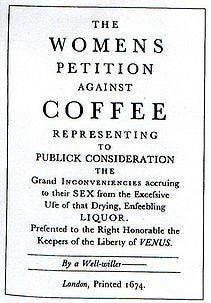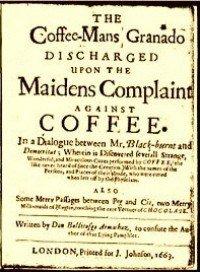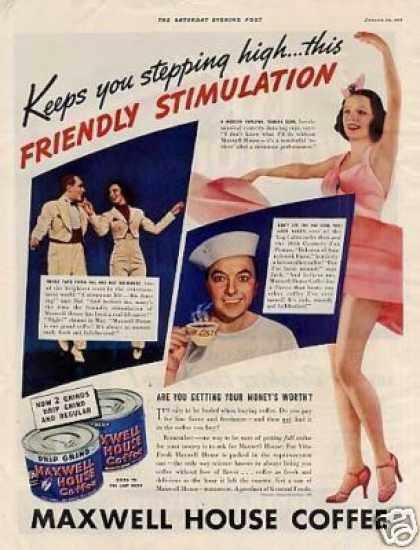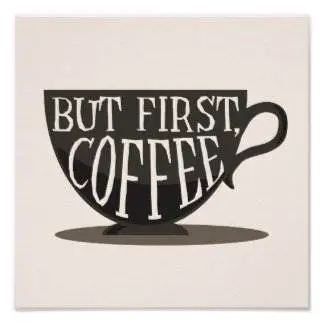It seems that all adventures begin all for a good cup of coffee. Many are fascinated with a good cup of coffee, many have expressed there fascination historically, and now I must express my fascination with coffee. This fascination has lead me on a mission to discover the best tasting cup of coffee ever. Unfortunately, my own fascination could not be as exciting as many in the past who embarked on their own journey to discover/conquer the best tasting cup of coffee. Think of this article as a brief journey into the history of man’s love for coffee.
Coffee aficionados commonly describe coffee as “seductive“. It would seem that coffee definitely deserves a reserved room to serve it because of its appealing smell, taste, and even feel. For this reason you could find an anthology of poems and writings about it on the internet or in your local library. Here is an early Arabic Poem in praise of coffee. Source
In Praise of Coffee
Translation from the Arabic
O Coffee! Thou dost dispel all cares,
thou art the object of desire to the scholar.
This is the beverage of the friends of God;
it gives health to those in its service who strive after wisdom.
Prepared from the simple shell of the berry,
it has the odor of musk and the color of ink.
The intelligent man who empties these cups of foaming coffee,
he alone knows truth.
May God deprive of this drink the foolish man
who condemns it with incurable obstinacy.
Coffee is our gold. Wherever it is served,
one enjoys the society of the noblest and most generous men.
O drink! As harmless as pure milk,
which differs from it only in its blackness.
The Ups and Downs of Coffee
Coffee has indeed come a long way from its birthplace in the ancient land of Abyssinia (Ethiopia). It’s
impact thereon to Europe, and then to the rest of the world was almost immediate. Coffee was indeed addictive, so much that Ludwig van Beethoven became obsessed with it, and Johann Sebastian Bach wrote a “Coffee Cantata”.
It reads:
“Dear Father, do not be so strict! If I can’t have my little demi-tasse of coffee three times a day, I’m just like a dried up piece of roast goat! Ah! How sweet coffee taste! Lovelier than a thousand kisses, sweeter far than muscat wine! I must have my coffee, and if anyone wishes to please me, let him present me with – coffee!”
Here is a video of it.

And as coffee grew in popularity, it became more and more controversial. Not everyone was happy to accept the popularity and interest coffee was getting. Frederick the Great was disgusted with the idea that coffee was getting more popular than the traditional drink (beer) in Germany. He insisted that his ancestors were brought up on beer, and so he issued a manifesto forbidding coffee roasting, except in official government establishments.
In England, the famous “Women’s Petition” complained that a “typical male day involved spending the morning in a tavern till everyone of them is as Drunk as a Drum, and then back again to the coffee house to drink themselves sober. Then they were off to the tavern again, only to stagger back to Soberize themselves with coffee.” The men’s response was indeed hilarious. This is how they replied…Coffee was “far from rendering them impotent. [Coffee] makes the erection more Vigorous, the “man milk” more full, adds a Spiritualescency to the Sperme”. Hmmm seems like I would have to start drinking some coffee myself lol ha ha ha!
Due to the uproar, on December 29, 1675, King Charles II issued a “Proclamation for the Suppression of Coffee.“


It looks like they were very serious about coffee back then. But the story isn’t quite finished. We still have to talk about coffee in the Caribbean. And, it gets quite interesting.
Stealing: For A Good Cup Of Coffee
In the Caribbean, the coffee story began as a James Bond 007 espionage movie, with a young naval officer, Gabriel de Clieu (1723). He obtained a seedling from a coffee plant in the Royal Botanical Garden in Paris and brought it [smuggled it rather lol] to the island of Martinique.
Later, in 1727, with Brazil wanting a market share in the emerging coffee market sent Lt. Col. Francisco de Melo Palheta to French Guiana on a covert mission to obtain coffee seedlings that was under heavy guard. The sly Palheta used his good looks and charm to engage the French Governor’s wife and tricked her into helping him obtain the seedlings which he received in a bouquet as a farewell gift. Today, Brazil produces about 1/3 of the world’s coffee. Not a bad trade off I must say.
Coffee Claims
Besides all that controversy and bacchanal (trini term), there were the many remarkable and somewhat unbelievable claims about coffee. One claim was that coffee would aid digestion, cure headaches, coughs, dropsy, gout, scurvy, and even prevent miscarriages. Many of these claims could be seen in ads. Even a British commentator said that “coffee-drinking produces greater sobriety among nationals“. I am not sure how many cared about proving these claims. However, today we are finding that there are some remarkable health benefits of drinking coffee such as protecting against type 2 diabetes and preventing Parkinson’s Disease. But read on there is still more…..

An old Maxwell House Coffee Ad from the 70’s
“Only one thing is certain about coffee…wherever it is grown, sold, brewed, and consumed, there will be lively controversy, strong opinions, and good conversation.” Mark Pendergrast
The Basic Need For A Good Cup Of Coffee
By 1750, coffee was grown on five continents. In the colonies, coffee growing and harvesting required intensive human labour. The commercialization of coffee soon began. The development of the coffee story was not always a good one. You will find stories of oppression, land dispossession of indigenous peoples, and the struggle of farmers and their family seeking a fair trade for their labour…
There was also the commodification of coffee, where the coffee was cheapened and the quality of the flavor was reduced. But a good quality coffee is always recognized by its aroma, body (feel or weight of the coffee in the mouth), acidity (tang or zest) and flavor (taste).
Coffee in Trinidad and Tobago
It is quite entertaining how man has had this long love affair with coffee over the centuries, so much so that it has also come home to Trinidad and Tobago, where we were once a colony of both the Spanish and English empires. Back then coffee and cocoa plantations abounded and still, even to this day, there are remnants of a time gone by . And I must say, some traditions are alive and well.
This is where I take up the coffee story in Trinidad and Tobago. Coming up next: Learn about where I discovered, almost by accident, the tastiest cup of coffee I have ever enjoyed, and how it was made traditionally. The story continues…
Reference:
Pendergrast, M. (1999). “Uncommon grounds: the history of coffee and how it transformed our world“. Revised ed. Basic Books. Philadelphia, PA
Weinberg, B. A. and Bealer, B. K.(2001). ” The world of caffeine: the science and culture of the world’s most popular drug”. Routledge, London.
Amelinckx, A. (2013). “Old time farm crime: The coffee spies of the 1700s” Modern Farmer website. http://modernfarmer.com/2013/08/old-time-farm-crime-the-coffee-spies-of-the-1600s/


Felix,
Let me just say as much as enjoy reading your newsletter and trying out your recipes. This ode to coffee; man, I really enjoy it. I never thought anyone else loved coffee as much as me. I enjoy my coffee with milk only or with milk and hazelnut creamer…..oh lord sweetness fuh so!